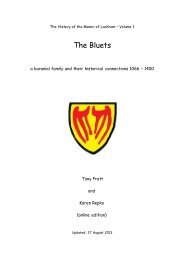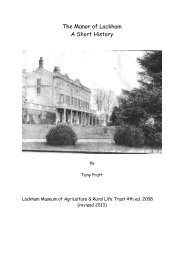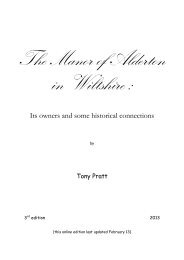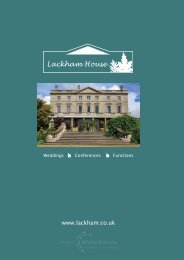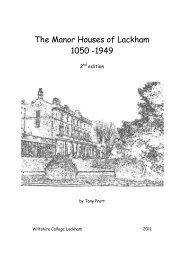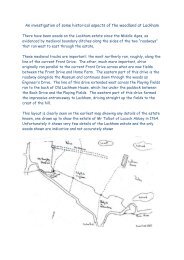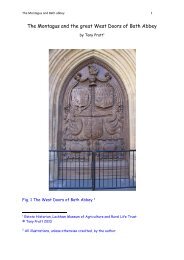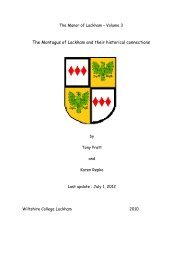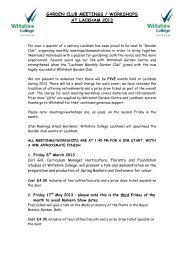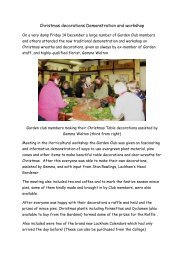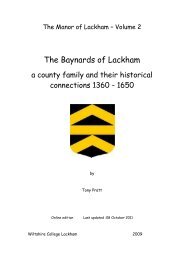History of Agricultural Education in Wiltshire - Lackham Countryside ...
History of Agricultural Education in Wiltshire - Lackham Countryside ...
History of Agricultural Education in Wiltshire - Lackham Countryside ...
You also want an ePaper? Increase the reach of your titles
YUMPU automatically turns print PDFs into web optimized ePapers that Google loves.
CHAPTER 1<br />
SUMMARY OF THE HISTORY OF AGRICULTURAL EDUCATION FROM<br />
THE 14th CENTURY<br />
Although Agriculture is the oldest and most important <strong>in</strong>dustry <strong>in</strong> Brita<strong>in</strong>, no<br />
organised <strong>Agricultural</strong> <strong>Education</strong> existed until the latter half <strong>of</strong> the 19th<br />
Century. For many generations, children learnt from their parents, knowledge<br />
and experience were handed down from one generation to the next. Several rich<br />
and famous men, however, carried out field trials and experiments, and their<br />
discoveries were made known through a few books, <strong>Agricultural</strong> Shows, Societies,<br />
Clubs, competitions etc. No grant aid was available as we know it today. The<br />
Rothamsted Research Station and the Royal <strong>Agricultural</strong> College were two<br />
isolated examples <strong>of</strong> privately endowed establishments created <strong>in</strong> 1843 and 1845<br />
respectively. Dauntseys School, West Lav<strong>in</strong>gton, founded <strong>in</strong> 1543, also <strong>in</strong>cluded<br />
Agriculture and Horticulture <strong>in</strong> its curriculum.<br />
The follow<strong>in</strong>g list <strong>of</strong> dates illustrates some <strong>of</strong> the major events <strong>in</strong> Agriculture<br />
and the names <strong>of</strong> men who pioneered experiments by trial and error.<br />
The first book on farm<strong>in</strong>g <strong>in</strong> English was written by Fitzherbert <strong>of</strong> Norbury <strong>in</strong><br />
1553 and was called the "Boke <strong>of</strong> Husbandry". He advocated the application <strong>of</strong><br />
plenty <strong>of</strong> "muck" and deep plough<strong>in</strong>g, followed by a spell <strong>of</strong> bare fallow. He was a<br />
great believer <strong>in</strong> sheep and wrote they were "The moste pr<strong>of</strong>ytablest cattell".<br />
A second book was written <strong>in</strong> poetry by Thomas Tusser, 1524 - 1580. It was<br />
entitled "A Hundreth Good Po<strong>in</strong>tes <strong>of</strong> Husbandrie". Like Fitzherbert, he found<br />
the application <strong>of</strong> "Compass" (muck) and bare fallow advantageous. Crops<br />
mentioned were peas, hops and saffron.<br />
Tusser's Advice:<br />
''Where stones be too many annoy<strong>in</strong>g the land Make<br />
servant come home with stone <strong>in</strong> his hand By daily so<br />
do<strong>in</strong>g, have plenty ye shall Both handsome for pav<strong>in</strong>g,<br />
and good for a wall".<br />
"If meadow be forward be mow<strong>in</strong>g <strong>of</strong> some But mow<br />
as the makers may well overcome Take heed to the<br />
weather, the w<strong>in</strong>d and the sky If danger approacheth



